[bannerTop]
Welcome to our Alltie “Virus” removal guide. The following instructions will aid you in removing the unwanted software from your PC.
In the article below we have gathered and summarized all the information that you have to know about Alltie “Virus”. This version of a browser hijacker is usually a harmless program, though, deeply irritating with the probable modifications of your browser apps that it could cause. Such modifications might include the production of some unwanted pop-ups and other ads while you are trying to surf the Internet. What’s more, some redirecting processes may be conducted. To top it all off, all your default homepages and search engines could change and new ones may be displayed. Furthermore, this type of software might really affect all your browsers – neither Chrome, nor Firefox and Explorer are immune such contamination. Continue reading and learn how to cure this contamination in a quick and sensible way. Good luck!
The real nature of the software called “browser hijackers”:
Contrary to what you may be expecting, Alltie “Virus” and its group mates are not really dangerous in any way. In fact, some of the existing hijackers may exhibit some unexplained and suspicious features such as the aforementioned ones, which might really annoy you. However, even these program’s abilities to use the history records of your browsers for the purpose of matching the ads stream to your supposed preferences are not a reason serious enough to identify this type of software as malicious.
What to expect from Alltie “Virus”:
Generally speaking, Alltie “Virus” may function as an exemplary hijacker. It can’t do anything more to your PC than what has already been described in the previous paragraphs. One more time, this program is merely marketing-oriented and can’t cause a lot of real trouble, except for the irritation and that’s all. Moreover, the creation of hijackers is a normal and legitimate process, which helps software developers make more money, and manufacturers – get their goods effectively advertised.
What is impossible when it comes to a hijacker infection?
Anything truly dangerous and bothering like encryption or destruction of data is highly improbable when we talk about Alltie “Virus”. This program differs from the exemplary Trojan and Ransomware-based viruses to a great extent. To give you an illustration, this version of software is practically incapable of accessing anything on your system – neither directories, nor particular files, except for the data about your recent online searches. And much on the contrary, the Trojans and Ransomwares, on the other hand, tend to get access to the entire system and corrupt or damage many aspects of it. Another thing that makes the known browser hijackers and the infamous virus groups even more different from each other are the normal ways all of them get distributed. While Trojans and Ransomware can invade your computer in an automatic way, without asking you for your approval, Alltie “Virus” can’t be installed without your (knowing or unknowing permission).
Where do browser hijackers usually hide?
When we talk about the potential means of spreading hijackers, we have to say that there may be tens of diverse sources. Still, some of them are more usual than others and we are going to discuss the most common ones mainly.
- Torrents and shareware – browser hijackers and Adware could be included inside torrents and shareware;
- Spam in any form – clicking on an online ad, which is spamming your browser, may lead to the infection with a hijacker and the generation of many other ads.
- Contaminated web pages – sometimes some websites contain ad-producing software and you may catch it via knowingly or unknowingly downloading and installing something from such a page.
- Nevertheless, the most common hijacker sources are the infamous bundle: these are sets of apps, programs and games which you can download and use for free. Sometimes such mixes contain ad-generating programs such as Alltie “Virus”. To be precise, you cannot catch any hijacker via downloading a bundle for free, the only way to do so is to install the entire bundle. Below you will see how to prevent an infection by choosing the correct installation feature and installing only the programs you need and only the features you want.
Performing an ideal installation process
It is essential to remember this tip. By doing so you will start developing some healthy surfing and computing habits, in general. The essence of the right installation process is to select the proper wizard feature. For that purpose, we will advise you to stay away from the features that install the entire bundle content: the “Easy”, the “Default” and the “Recommended” one. Instead, install only what you really need and want via the following options – the “Custom”, the “Advanced”, or the “Customized” one.
Getting rid of Alltie “Virus”
Luckily, such contamination can be counteracted by following the appropriate instructions. We have already gathered them all in our Removal Guide below. Stick to them closely and eventually – you may be able to remove this irritating hijacker.
SUMMARY:
| Name | Alltie “Virus” |
| Type | Browser Hijacker |
| Danger Level | Medium (nowhere near threats like Ransomware, but still a security risk) |
| Symptoms | The mass production of a huge number of ads; redirecting and new homepages setting are possible. |
| Distribution Method | Via bundling, spam spreading, torrent sharing and contagious web pages of various sorts. |
Alltie “Virus” Removal
I – Safe mode and revealing hidden files
II – Uninstallation
[bannerMiddle]
- Use the Winkey+R keyboard combination, write Control Panel in the search field and hit enter.

- Go to Uninstall a program under Programs.

- Seek the unwanted software, select it and then click on Uninstall
If you are unable to spot Alltie “Virus”, search for any unrecognized programs that you do not remember installing on your PC – the unwanted software might disguise itself by going under a different name.
III – Cleaning all your browsers
- Go to your browser’s icon, right-click on it and select Properties.

- Go to the Shortcut tab and in the Target make sure to delete anything written after “.exe”.

- Now, open your browser and follow the instructions below depending on whether you are using Chrome, Mozilla or IE.
- Chrome users:
- Go to your browser’s main menu located in the top-right corner of the screen and select Settings.
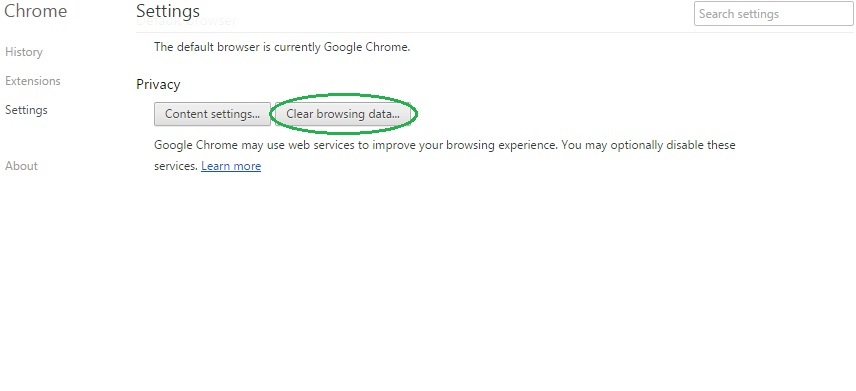
- Scroll down, click on Show Advanced Settings and then select Clear browsing data. Just to be sure, tick everything and clear the data.
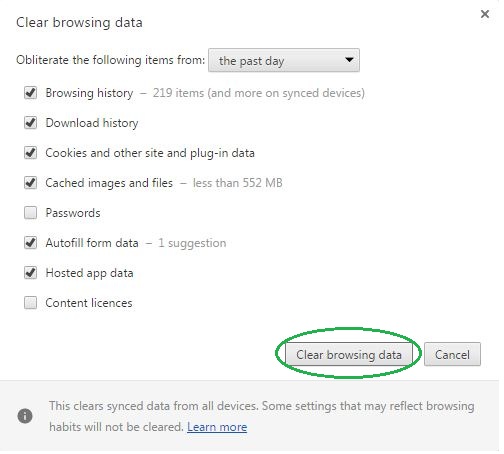
- Now, in the left pane, go to Extensions and look through all extensions that are integrated within your browser. If you notice any suspicious add-on, disable it and then remove it.
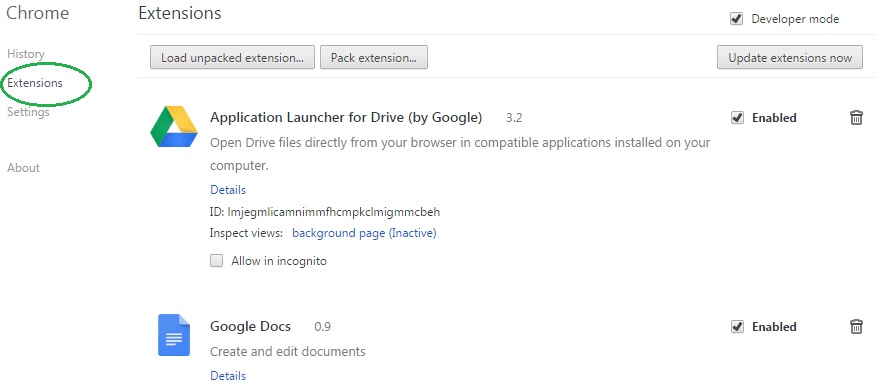
- Firefox users:
- Similarly to Chrome, go to the main menu and select Add-ons and then Extensions.
- Remove any suspicious browser extensions that you may have even if they do not have the name Alltie “Virus” on them.
- IE users:
- Go to Tools and select Manage add-ons.

- Click on all add-on types from the left pane and check if there is anything suspicious in the right panel. In case you find anything shade, make sure to remove it.
IV – Removing Shady processes
[bannerMiddleSecond]
- Go to your start menu, type Task Manager in the search field and from the results open View running processes with Task Manager.

- Thoroughly look through all processes. The name Alltie “Virus” might not be there, but if you notice any shady looking process that consumes high amounts of memory it might be ran by the unwanted program.
- If you spot the process ran by Alltie “Virus”, right-click on it, open its file location and delete everything in there. Then go back to the Task Manager and end the process.

V – DNS check
- In the start menu search box write View Network Connections and open the first result.
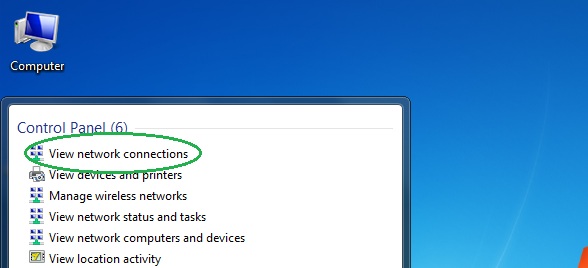
- Right-click on the network connection you are using and go to Properties.

- Select Internet Protocol Version (TCP/IPv4) and click on Properties.

- If Obtain DNS server addresses automatically is not checked, check it.
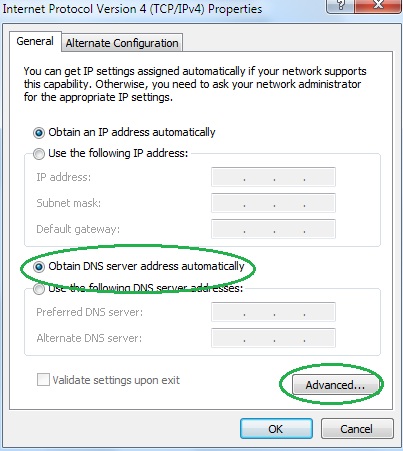
- Go to Advanced and select the DNS If there is anything in the DNS server addresses field, remove it and click OK.

- Click OK on the rest of the opened windows.





Leave a Reply